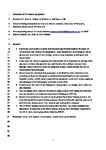Strandings of NE Atlantic gorgonians
| dc.contributor.author | Sheehan, Emma | |
| dc.contributor.author | Rees, A | |
| dc.contributor.author | Bridger, D | |
| dc.contributor.author | Williams, T | |
| dc.contributor.author | Hall-Spencer, Jason | |
| dc.date.accessioned | 2018-11-26T11:00:28Z | |
| dc.date.available | 2018-11-26T11:00:28Z | |
| dc.date.issued | 2017-05 | |
| dc.identifier.issn | 0006-3207 | |
| dc.identifier.issn | 1873-2917 | |
| dc.identifier.other | C | |
| dc.identifier.uri | http://hdl.handle.net/10026.1/12885 | |
| dc.description | Publisher policy: author can archive post-print on open access repository after an embargo period of 18 months. Publisher's version/PDF cannot be used. Must link to publisher version with DOI. Author's post-print must be released with a Creative Commons Attribution Non-Commercial No Derivatives License. publisher: Elsevier articletitle: Strandings of NE Atlantic gorgonians journaltitle: Biological Conservation articlelink: http://dx.doi.org/10.1016/j.biocon.2017.03.020 content_type: article copyright: © 2017 Elsevier Ltd. All rights reserved. | |
| dc.description.abstract |
Northeast coral gardens provide vital breeding and feeding habitats for fishes of conservation and commercial importance. Such habitats are increasingly at risk of destruction as a result of over fishing, ocean warming, acidification and marine litter.A key cause for concern regarding the vulnerability of coral gardens to damage from any source is their slow growth rate, and thereby their ability to recover from damage. Hence protected areas are being put in place, which exclude the use of towed demersal fishing gear.Citizen scientists observed that gorgonian coral (Pink Sea Fans) skeletons were stranding on beaches entangled in marine debris (sea fangles) across southwest England. Further, SCUBA divers reported that gorgonian corals were being caught up and damaged in lost fishing gear and other marine litter.To determine the cause of the damage to coral gardens, sea fangles were collected and analysed.The sea fangles were made up of a diverse range of litter from fishing and domestic sources, however, the majority comprised of fishing gear (P<0.05).Marine Protected Areas can protect coral gardens from direct fishing pressure, but risks still remain from ghost fishing pressure, demonstrating the need for sources of litter into the environment to be reduced and existing litter removed.The EU Marine Strategy Framework Directive (MSFD) outlines targets for marine litter by 2020. This study highlights the importance of adhering to the MSFD and/or creating more ambitious regulation if the UK re-write existing legislation following BREXIT. | |
| dc.format.extent | 482-487 | |
| dc.format.medium | Undetermined | |
| dc.language | en | |
| dc.language.iso | en | |
| dc.publisher | Elsevier BV | |
| dc.subject | Coral | |
| dc.subject | Reef | |
| dc.subject | Benthic | |
| dc.subject | Conservation | |
| dc.subject | Marine litter | |
| dc.subject | Ghost fishing | |
| dc.title | Strandings of NE Atlantic gorgonians | |
| dc.type | journal-article | |
| dc.type | Journal Article | |
| plymouth.author-url | https://www.webofscience.com/api/gateway?GWVersion=2&SrcApp=PARTNER_APP&SrcAuth=LinksAMR&KeyUT=WOS:000404308600053&DestLinkType=FullRecord&DestApp=ALL_WOS&UsrCustomerID=11bb513d99f797142bcfeffcc58ea008 | |
| plymouth.volume | 209 | |
| plymouth.publication-status | Published | |
| plymouth.journal | Biological Conservation | |
| dc.identifier.doi | 10.1016/j.biocon.2017.03.020 | |
| plymouth.organisational-group | /Plymouth | |
| plymouth.organisational-group | /Plymouth/Faculty of Science and Engineering | |
| plymouth.organisational-group | /Plymouth/Faculty of Science and Engineering/School of Biological and Marine Sciences | |
| plymouth.organisational-group | /Plymouth/PRIMaRE Publications | |
| plymouth.organisational-group | /Plymouth/REF 2021 Researchers by UoA | |
| plymouth.organisational-group | /Plymouth/REF 2021 Researchers by UoA/UoA07 Earth Systems and Environmental Sciences | |
| plymouth.organisational-group | /Plymouth/Research Groups | |
| plymouth.organisational-group | /Plymouth/Research Groups/Marine Institute | |
| plymouth.organisational-group | /Plymouth/Users by role | |
| plymouth.organisational-group | /Plymouth/Users by role/Academics | |
| dcterms.dateAccepted | 2017-03-25 | |
| dc.identifier.eissn | 1873-2917 | |
| dc.rights.embargoperiod | Not known | |
| rioxxterms.versionofrecord | 10.1016/j.biocon.2017.03.020 | |
| rioxxterms.licenseref.uri | http://www.rioxx.net/licenses/all-rights-reserved | |
| rioxxterms.licenseref.startdate | 2017-05 | |
| rioxxterms.type | Journal Article/Review | |
| plymouth.funder | Testing resilience in Marine Protected Areas using storm disturbance in Lyme Bay, SW England::NERC | |
| plymouth.oa-location | https://www.researchgate.net/publication/315927110_Strandings_of_NE_Atlantic_gorgonians |


